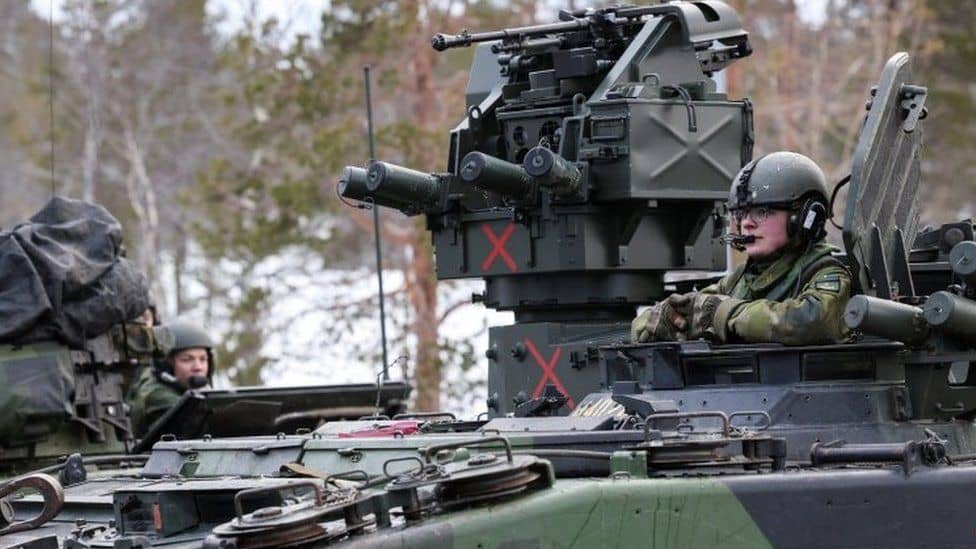Turkey threatens to block Finland and Sweden Nato bids
17 May, 2022

Turkey's president has restated his opposition to Finland and Sweden joining Nato - just hours after they said they would seek membership.
Recep Tayyip Erdogan said the two Scandinavian nations need not send delegations to convince Turkey, a key Nato member, of their bids.
He is angered by what he sees as their willingness to host Kurdish militants.
Earlier, Sweden said Europe was living in a dangerous new reality, referring to Russia's invasion of Ukraine.
Russian President Vladimir Putin said the move by Finland and Sweden to join the 30-member military alliance did not threaten Moscow directly - but stressed that any expansion of military infrastructure would trigger a response from the Kremlin. At a news conference on Monday, Mr Erdogan said Turkey opposed the Finnish and the Swedish bids to join Nato, describing Sweden as a "hatchery" for terrorist organisations.
"Neither of these countries have a clear, open attitude towards terrorist organisation. How can we trust them?" the Turkish president said.
Turkey accuses the two Nordic nations of harbouring members of the Kurdistan Workers' Party (PKK), a group it views as a terrorist organisation, and followers of Fethullah Gulen, who Ankara accuses of orchestrating a 2016 coup attempt.
All member states must agree that a new country can join Nato, therefore Sweden and Finland require Turkey's support in their bid to join the military alliance.
Mr Erdogan said Swedish and Finnish delegations should not bother going to Ankara, Turkey's capital, to convince it to approve their Nato bid.
His government has also pledged to block applications from countries that have imposed sanctions on it.
In 2019, both Nordic nations slapped an arms embargo on Ankara after its incursion into Syria.
Speaking in parliament in Helsinki on Monday, Finnish Foreign Minister Pekka Haavisto said he was surprised by Turkey's stance, but added that his government was not interested in "bargaining" with Mr Erdogan.
Finland formally announced its bid to join Nato last week.
It was joined by neighbour Sweden on Saturday in a move that will end the Scandinavian country's centuries-long military non-alignment.
"Nato will strengthen Sweden, Sweden will strengthen Nato," Prime Minister Magdalena Andersson said at a briefing on Monday.
She said Europe was now living in a dangerous new reality, referring to Russia's invasion of Ukraine.
"We are leaving one era behind us and entering a new one," Ms Andersson told lawmakers during a debate in Stockholm, also on Monday.
She said a formal application could be handed within several days and would be synchronised with Finland. Nato has signalled its willingness to admit the two new members.
However, Ms Andersson stressed that Sweden did not want permanent Nato bases or nuclear weapons on its territory.
Norway, Denmark and Iceland - all Nato members - immediately said they were ready to support Sweden and Finland by all means necessary if they came under attack.
For Finland and Sweden to join Nato, all 30 existing members must say yes. But for now, one is saying no.
President Erdogan says he won't agree to admit countries which apply sanctions on Turkey.
Sweden suspended arms sales to Turkey three years ago, following Ankara's military intervention in Syria. And according to the official Turkish news agency, both Finland and Sweden have rejected dozens of requests to extradite Kurdish militants who Turkey describes as terrorists.
Both countries are sending delegations to Ankara to try and solve the problem, but President Erdogan says they shouldn't bother.
He seems determined to extract a price for his precious vote.
On Sunday, the US Secretary of State, Antony Blinken, said he was confident that Finland and Sweden would both join, despite Turkish objections.
The issue is likely to dominate discussions between Mr Blinken and his Turkish opposite number in Washington on Wednesday. Having encouraged the two Nordic countries to apply, Washington won't want to let them down at the 11th hour.
Source: www.bbc.com
